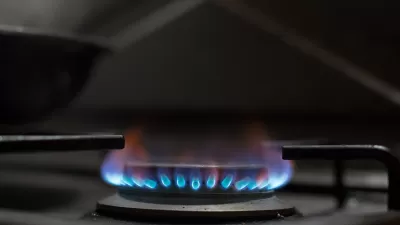Overtaxed pipelines, train accidents, and natural gas 'flaring' are just some of the symptoms of the strain North America's oil and gas boom is placing on the continent's infrastructure. Can needed upgrades be reconciled with environmental goals?
"Over the past few years, the U.S. fracking boom has taken a great many people by surprise. Companies have been producing so much oil and gas that it’s now putting a strain on America’s energy infrastructure," writes Brad Plumer.
While the recent Lac-Mégantic oil train derailment was a stark reminder of the safety issues associated with the transition of oil transport from pipeline to "crude-by-rail", "it’s worth emphasizing that there’s much more than rail safety and Keystone XL to consider," says Plumer. "In the most recent issue of Democracy, former White House energy adviser Jason Bordoff makes an extended argument that North America’s energy infrastructure has yet to catch up with growing oil and gas production in all sorts of ways."
"The piece also takes time to stress the need to tackle climate change, and Bordoff wonders if there’s a deal to be made here between environmentalists and industry (while noting that there 'is good reason to be skeptical about the prospects for such a deal'):
The energy grand bargain we need is simple: Government must take steps that help the oil and gas industry develop America’s newfound abundance even more quickly—on permitting, exports, the Jones Act, clear and sensible fracking safety regulations, and other issues—while industry works with government on longer-term actions to meaningfully reduce carbon emissions. [...]
FULL STORY: The U.S. oil and gas boom is straining the country’s infrastructure

Maui's Vacation Rental Debate Turns Ugly
Verbal attacks, misinformation campaigns and fistfights plague a high-stakes debate to convert thousands of vacation rentals into long-term housing.

Planetizen Federal Action Tracker
A weekly monitor of how Trump’s orders and actions are impacting planners and planning in America.

Chicago’s Ghost Rails
Just beneath the surface of the modern city lie the remnants of its expansive early 20th-century streetcar system.

Bend, Oregon Zoning Reforms Prioritize Small-Scale Housing
The city altered its zoning code to allow multi-family housing and eliminated parking mandates citywide.

Amtrak Cutting Jobs, Funding to High-Speed Rail
The agency plans to cut 10 percent of its workforce and has confirmed it will not fund new high-speed rail projects.

LA Denies Basic Services to Unhoused Residents
The city has repeatedly failed to respond to requests for trash pickup at encampment sites, and eliminated a program that provided mobile showers and toilets.
Urban Design for Planners 1: Software Tools
This six-course series explores essential urban design concepts using open source software and equips planners with the tools they need to participate fully in the urban design process.
Planning for Universal Design
Learn the tools for implementing Universal Design in planning regulations.
planning NEXT
Appalachian Highlands Housing Partners
Mpact (founded as Rail~Volution)
City of Camden Redevelopment Agency
City of Astoria
City of Portland
City of Laramie




























